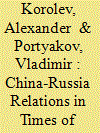| Srl | Item |
| 1 |
ID:
147299


|
|
|
|
|
| Summary/Abstract |
Grounded in an analysis of the unique advantages of China-Russia relations, the paper argues that the two countries have established a high level of political trust and will continue to work in concert on all fronts. It also looks back at how China entered into alliances throughout its history and the lessons it has learned from those experiences. It emphasizes that China does not deem the establishment of exclusive alliances or political blocs as a foreign policy option.
|
|
|
|
|
|
|
|
|
|
|
|
|
|
|
|
| 2 |
ID:
160717


|
|
|
|
|
| Summary/Abstract |
Although not formal allies, China and Russia have steadily increased their strategic cooperation. However, crises and tensions in each other's areas of strategic interest continue to complicate each country's relations with the other and the rest of the international community. In this article we explore China's reaction toward major crises in the post-Soviet space (the Caucasus crisis of 2008 and the Ukraine crisis of 2014) and Russia's responses to the South China Sea dispute and show that they share many similarities. To explain the reaction patterns and better understand the nature of contemporary China-Russia relations, we apply a neoclassical realist framework, which helps assess the impact of both system-level and unit-level factors on great powers' behavior. The assessment demonstrates that the observed behavior pattern is an outcome of causal forces of different levels simultaneously pushing in different directions.
|
|
|
|
|
|
|
|
|
|
|
|
|
|
|
|
| 3 |
ID:
162099


|
|
|
|
|
| Summary/Abstract |
In the past few years, there has been a significant economic and political rapprochement between China and Russia, marked by the announcement of numerous trade agreements and investments in transport infrastructure and the exploitation of Russian natural resources. This cooperation seems to have intensified since the 2014 Ukrainian crisis. Some European and American media see it as a sign that China and Russia are developing a form of strategic alliance that could harm Western interests. This article analyses the different forms of Sino-Russian rapprochement whilst highlighting the economic and political limits of this cooperation.
|
|
|
|
|
|
|
|
|
|
|
|
|
|
|
|
| 4 |
ID:
164834


|
|
|
|
|
| Summary/Abstract |
This article attempts to advance the neoclassical realist framework by elaborating on the interaction between system-level and unit-level factors in the formation of states’ behavior. With an empirical focus on post-Cold War China–Russia relations, which represent the ambivalent combination of a consistently growing strategic entente and a simultaneous reluctance to form a full-fledged political-military alliance, this study establishes two major unit-level factors – differing economic models and negative historical memories – that create hurdles for alliance formation between the two countries. However, under greater systemic pressure from the US-led unipolarity, China’s and Russia’s state leaders have not only increased bilateral military-to-military cooperation but have begun to actively implement policies to deliberately transform, if not remove, the existing non-systemic hurdles. Therefore, the neoclassical realist framework can be understood and further tested as a dynamic interaction model in which the unit-level circumstances, while moderating the causal impact of the system, are themselves being transformed by the system via state policies, as is their impact on states’ foreign policy.
|
|
|
|
|
|
|
|
|
|
|
|
|
|
|
|
| 5 |
ID:
160714


|
|
|
|
|
| Summary/Abstract |
In this article I analyze the China-Russia strategic partnership of cooperation from a constructivist perspective. By employing Wendt's concepts and structures of identity to understand relations between China and Russia, and their relations with other countries, I seek to elucidate the drivers of the current China-Russia partnership and shed light on the reasons why, despite burgeoning ties, the two countries have not established a formal alliance. I argue that both China and Russia are in the process of reconstructing their national identities while also integrating into the international community. There exists an ideational foundation for the China-Russia strategic partnership, but divergent concepts of harmony and honor make China and Russia act differently when interacting with a third party in the international community. I argue that China and Russia are still on the way to forming a shared concept of strategic partnership. Beijing and Moscow are not likely to set an alliance arrangement against a third party in the foreseeable future.
|
|
|
|
|
|
|
|
|
|
|
|
|
|
|
|